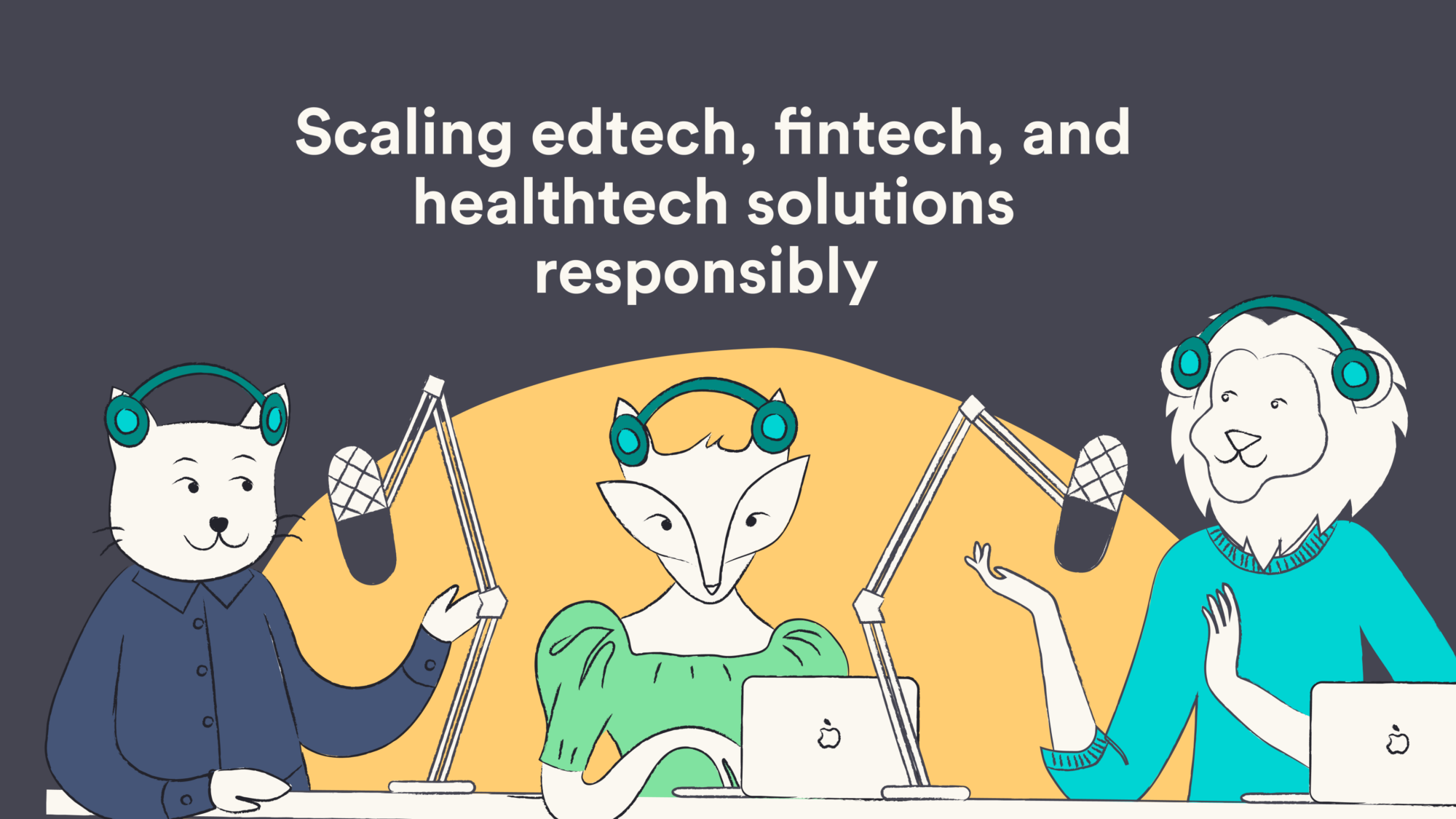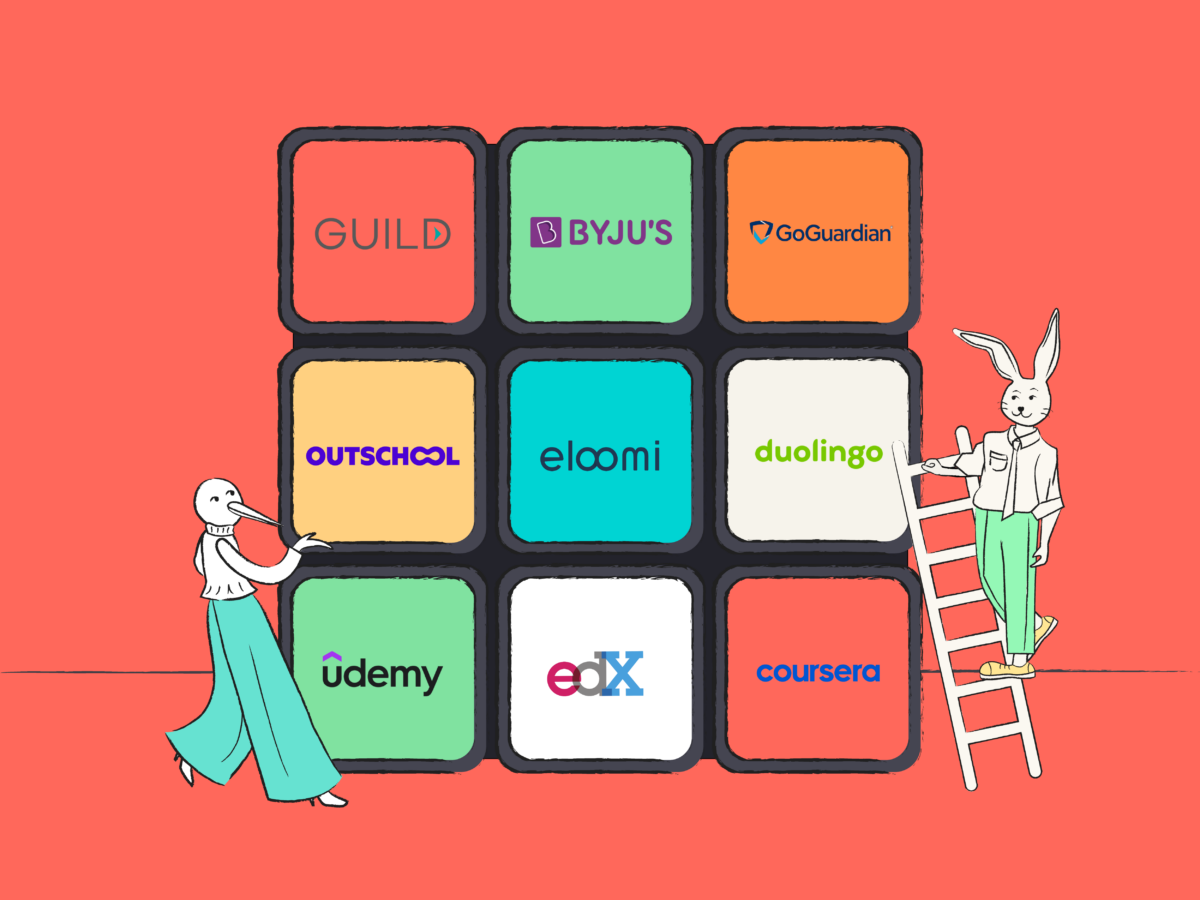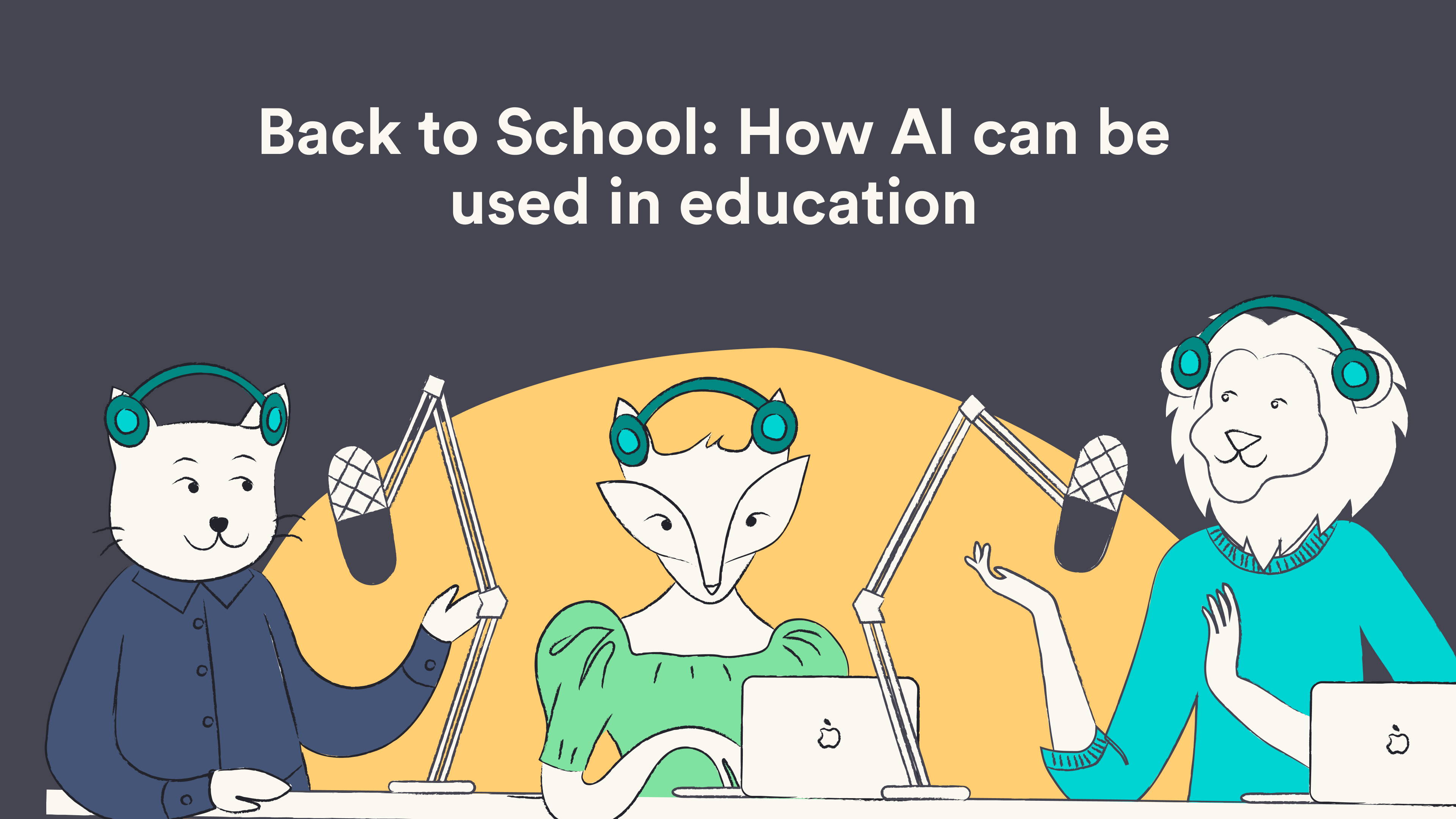It’s an exciting time to be at the nexus of education and technology, considering the numbers: the edtech space is predicted to grow from $183.4 billion in 2021 to $410.2 billion by 2026, with edtech adoption in schools seeing a 99% increase since 2020.
The lesson? For edtech companies, these numbers spell out a future rich with opportunity yet crowded with contenders eager to make the grade. This is where a solid marketing strategy comes in, separating the valedictorians from the dropouts.
With venture capital pouring in at a record-breaking $20.8 billion in 2021 — forty times what it was just over a decade ago — your marketing strategy can attract investors as well as new customers.
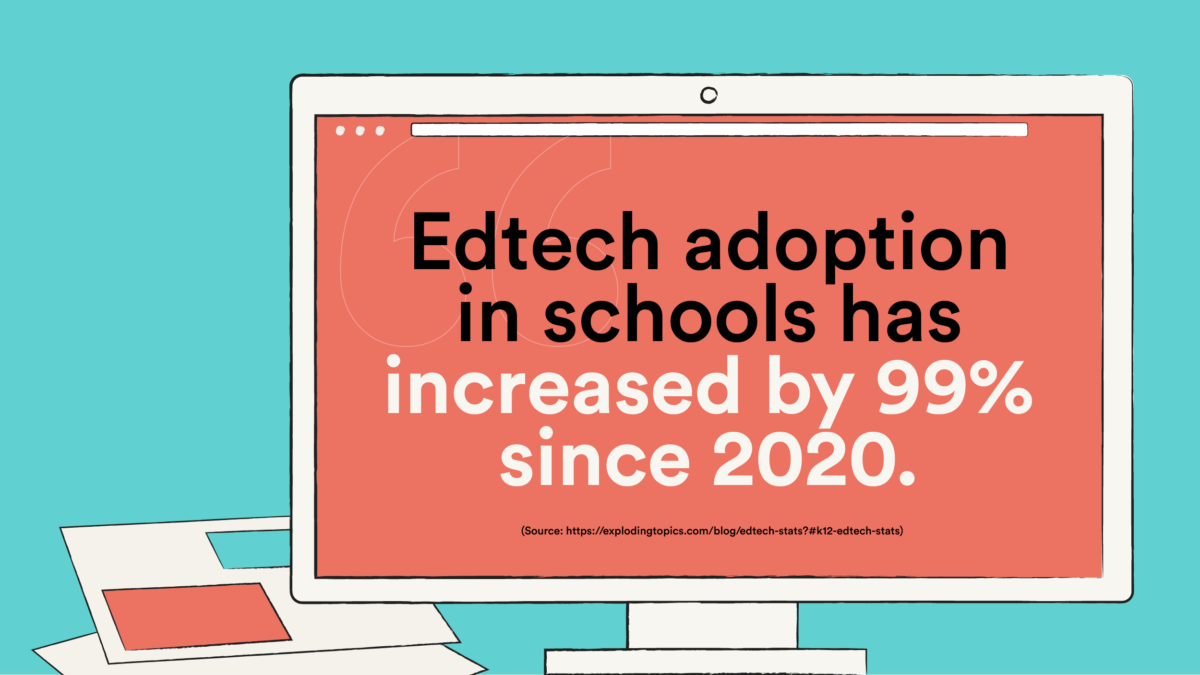
To run a successful edtech business, the equation is simple: an innovative learning experience plus a standout marketing strategy equals the formula for success in this burgeoning market. So, let’s roll up our sleeves and plot the graph that will chart your brand’s course to the top of the class.
What Is an Edtech Marketing Strategy?
An edtech marketing strategy is a blueprint for connecting with your ideal customer, aiming to engage educators, institutions, students, and vital stakeholders with targeted messaging.
A successful digital marketing strategy for education technology requires storytelling with purpose. It should showcase how these tools enrich learning and teaching while being dynamic and flexible enough to adapt to the educational field’s changing demands.
As teaching methodologies evolve and student needs shift, so does the strategy, ensuring the marketing remains as contemporary and relevant as the technology it represents.
The Goals and Challenges of an Edtech Marketing Strategy
Edtech marketers should establish clear objectives while taking into account the potential challenges that may arise.
Goals
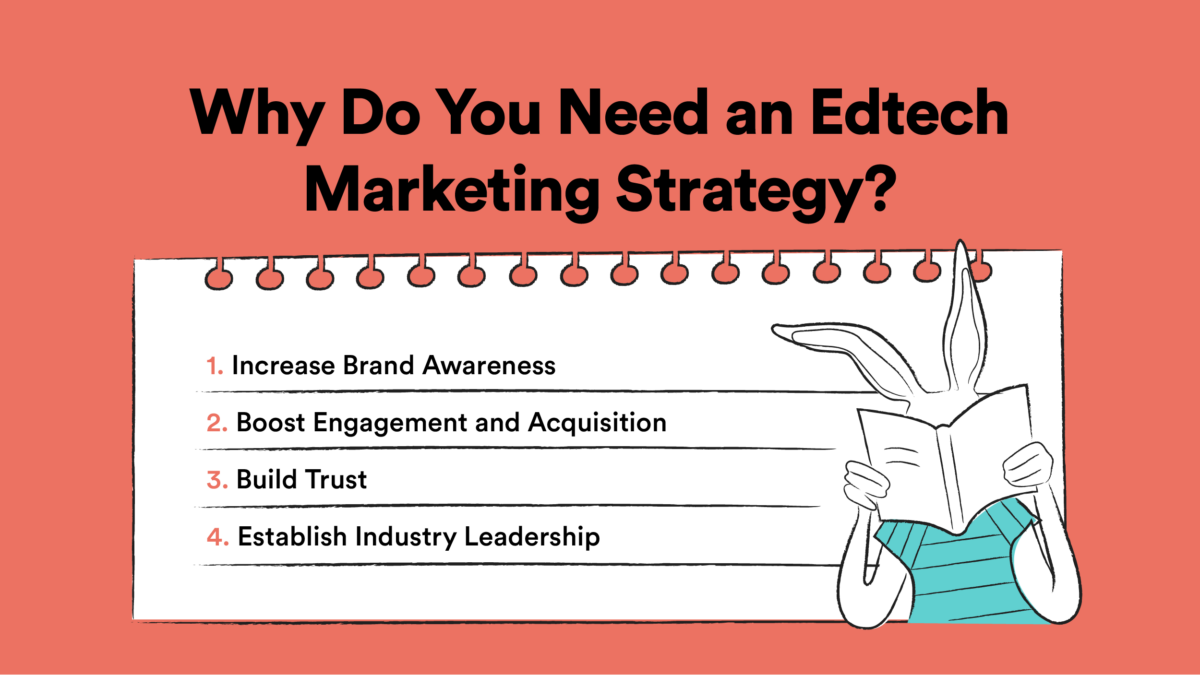
Most marketing strategies for edtech brands aim to achieve one or more of the following goals:
1. Increase Brand Awareness
Putting your brand on the virtual map of every stakeholder in the educational ecosystem.
2. Boost User Engagement and Customer Acquisition
The strategy should orchestrate interactions that provide value, capture interest, and guide users toward a purchase.
3. Build Trust
Building credibility through reliable content, testimonials, and case studies that resonate with the needs and successes of its users.
4. Establish Industry Leadership
The ultimate goal is to be seen as a thought leader that shapes trends rather than follows them.
Challenges
Edtech brands face challenges that are unique to the sector, and addressing them requires both thorough planning and the ability to pivot quickly. Some of the specific obstacles edtech companies face include the following:
1. Rapid Technological Changes
Marketing strategies must be agile to keep the brand aligned with the fast-moving edtech industry and ensure messaging stays relevant.
2. Diverse Target Audience
From kindergartners to college professors, the audience in education is a mosaic of needs and preferences. Therefore, crafting a message that resonates with your audience is essential.
3. Long Sales Cycles
Decision-making in education can be as lengthy as a doctoral thesis, so patience and persistent nurturing are key to eventually closing the deal.
4. Regulatory Constraints
The education sector often dances to a complex tune of regulations. Marketing strategies must move within these guidelines, ensuring compliance while still engaging creatively with the audience.
5. Competition
With many players on the field, standing out requires not just a unique value proposition but also a strategy that differentiates your brand from the chorus of competitors.
8 Edtech Marketing Strategies to Incorporate into Your Workflow
1. Content Marketing
Your content strategy should aim to reach users across different channels, creating a well-rounded experience.
For instance, educational webinars serve as a platform to illuminate educational challenges and demonstrate how edtech products can provide solutions while building trust and authority.
Meanwhile, using blog posts, you can tackle relevant questions and explore current edtech trends, establishing the brand as a thought leader while making your website more visible on search engines.
Lastly, crafting e-books and whitepapers offers substantial value to educators and decision-makers by delving deeper into issues and showcasing the brand’s expertise and insights in the field.
2. Search Engine Optimization (SEO)
Edtech brands can harness SEO to climb the ranks in search results. For instance, effective keyword research is foundational for pinpointing the terms your audience uses when searching for edtech providers.
These keywords will inform your on-page optimization: meticulously tailor your website’s content — from the headers and text to meta tags and URLs — ensuring they all incorporate the targeted keywords. This strategic placement helps search engines easily decipher and rank your site’s relevance to those terms.
Another great way to build authority and rise through the search engine ranks is through backlinks. When reputable external sites link back to yours, it’s an endorsement that amplifies your site’s credibility in the competitive realm of search engines.
3. Email Marketing
Edtech brands can cultivate impactful connections through strategic email marketing, starting with segmentation, which divides your email list into focused groups — think educators, administrators, or those at various buying stages. This enables messages to hit the right note with the right audience.
Segmentation will help you achieve greater personalization in your marketing emails by fine-tuning messages to echo the distinct needs and interests of each segment, making every communication feel like it’s tailored just for them.
Measure the success of your email marketing campaigns by tracking open rates, click-through rates, and conversions. This provides actionable insights to refine future email strategies, ensuring that every send moves the needle closer to your goals.
4. Video Marketing
In a world of short attention spans, video marketing is a great way to animate your messaging and captivate your target audience. Some ideas for edtech marketing videos include:
- Product demos: visual tours that highlight the sleek, intuitive design and the impactful benefits of your products, illustrating their ease of use and effectiveness in real-time.
- Testimonials turn customer satisfaction into storytelling, offering authentic narratives that resonate with potential users and fostering trust and credibility.
Educational content transcends mere promotion, providing viewers with valuable knowledge on relevant subjects or step-by-step guides on leveraging your product for maximum educational impact.
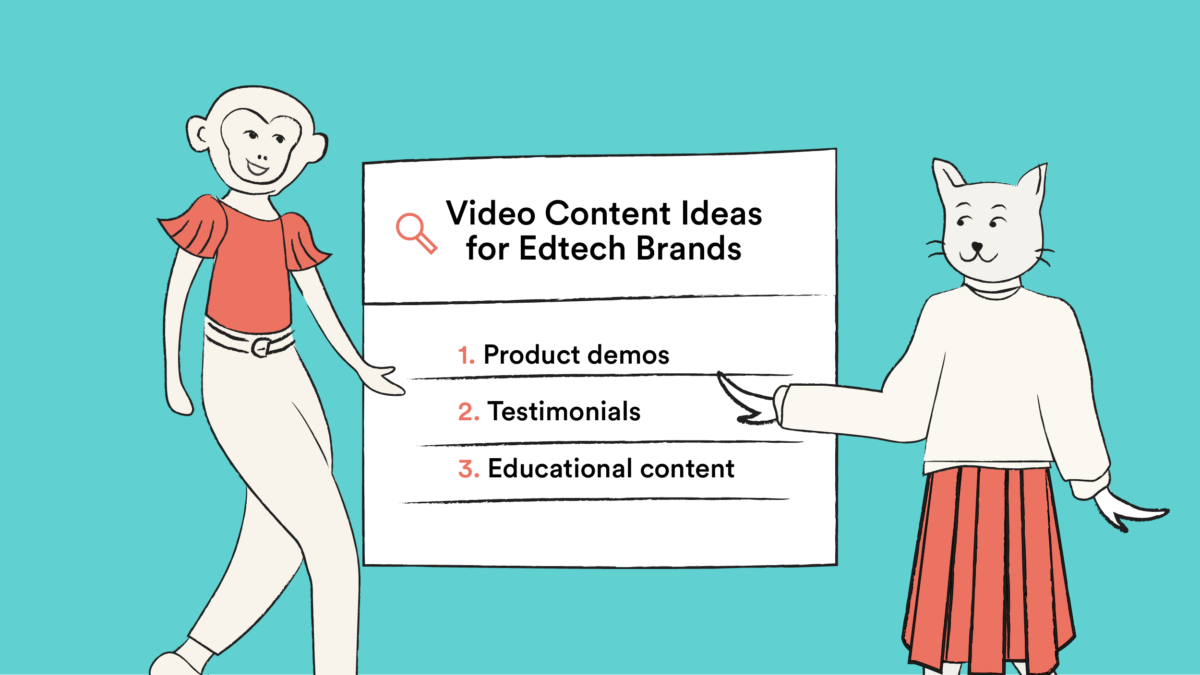
5. Social Media Marketing
Social media marketing campaigns are vital for edtech brands aiming to enhance their online presence, and it all starts with sharing high-quality, useful content, ranging from blog articles to instructional videos.
But don’t just “post and pray” — engaging with your audience is crucial. By promptly responding to comments and joining conversations, you can build a supportive community, encouraging loyalty and repeat engagement.
Additionally, leveraging paid social ads with precise targeting can extend your reach significantly, funneling a more extensive, relevant audience towards specialized content or product landing pages, ultimately boosting website traffic and potential conversions.
6. Pay-Per-Click (PPC) Advertising
PPC (Pay-Per-Click) advertising empowers edtech brands with precision-targeting capabilities. When executed well, PPC advertising can significantly boost online visibility and drive efficient user acquisition.
Keyword bidding enables you to bid on search terms directly tied to your products and educational content, placing their ads squarely in front of users actively seeking edtech solutions.
The success of PPC also hinges on landing page optimization; the pages that ads lead to must be highly relevant and designed with conversion in mind.
These pages should continue the narrative that the ad started, providing a seamless and compelling user experience that encourages visitors to take the desired action, whether that’s signing up for a webinar, downloading a resource, or starting a free trial.
7. Tailor Your Message
When communicating your edtech brand’s strengths, a clear value proposition is essential. Make sure you articulate the unique benefits of your product in a way that’s instantly graspable — for instance, avoid jargon and opt for clear, accessible language that both educators and tech novices can understand to ensure your message is inclusive.
One of the most effective messaging strategies is a problem-solution approach: succinctly outline the educational challenges your audience faces and demonstrate how your product stands out as the solution. This method clarifies the product’s relevance while establishing your brand as an ally in education.
8. Buyer Journey Mapping
Mapping the buyer journey is critical for guiding potential customers through the funnel. During the Awareness Stage, generate content that illuminates the current challenges within the education sector, educating your audience and seeding interest in solutions.
As customers progress to the Consideration Stage, supply them with resources — like detailed guides or webinars — that aid in assessing various edtech options and position your brand as a knowledgeable advisor.
At the pivotal Decision Stage, present compelling content — such as case studies or comparison charts — that underline your product’s benefits, tipping the scales and convincing potential buyers that your solution is the optimal choice for their educational needs.
8 Mistakes to Avoid in an Edtech Marketing Strategy
In the vibrant world of edtech, marketing missteps can be more than just blunders; they can be missed opportunities. To craft a strategy that resonates and converts, it’s essential to avoid common pitfalls, such as the following.
1. Ignoring the End User
The golden rule in edtech marketing is to keep a laser focus on the end user. Skipping conversations with educators can lead to a misalignment between product features and classroom needs.
Similarly, overlooking the students and administrators can result in a product that fails to resonate or even reach the market. After all, these are the stakeholders who will ultimately decide your product’s fate.
2. Neglecting SEO
SEO is akin to the beacon that guides ships to shore; without it, your product is invisible to those searching for it. Not targeting the right keywords or having a website that’s not optimized for user experience and search engines is like winking in the dark — you know what you’re doing, but nobody else does. Engaging, valuable content is the hook that draws your audience in and keeps them coming back.
3. Overlooking Email Marketing Best Practices
Email marketing is a fine art that, when done right, can yield significant returns. Generic emails are the white noise of the inbox; they’re easily ignored and forgotten.
Bombarding inboxes can lead recipients to hit ‘unsubscribe’ faster than you can say ‘edtech.’ And if you’re not poring over your campaign analytics, you’re missing out on insights into user behavior that could drive your strategy forward.
4. Being Vague
In a sector where clarity is king, jargon and unclear messaging can be the chasm between interest and action. A message that can’t quickly convey the unique benefits and standout features of your product is a message that’s lost.
5. Not Utilizing Video
Video content is not just an option; it’s a necessity. Forgoing this medium is a misstep, as is creating content that lacks professionalism or clarity. Without strategic promotion, even the best video content can go unnoticed.
6. Misusing Social Media
On social media, value trumps volume. An overemphasis on sales pitches can tire an audience, ignoring engagement can come across as aloof, and not addressing negative feedback can damage trust and brand reputation.
7. Not Tracking and Analyzing
Analytics should be the backbone of your marketing strategy, offering insights and guiding decisions. Ignoring data can lead to wasteful practices, and a lack of focus on conversion metrics can inflate your sense of success without any real returns.
8. Not Understanding the Buyer’s Journey
Recognizing that each customer is on a unique journey is crucial. Generic marketing fails to address the varied needs of customers at different decision stages, and a lack of focus on nurturing and retention can mean your marketing efforts are only as good as your last sale.
How Do You Measure Edtech Marketing Success?
Evaluating the success of an edtech marketing strategy hinges on monitoring specific metrics that reflect the campaign’s performance and impact. Consider looking at the following campaign data to measure success:
- Website analytics provide a window into traffic and user engagement, revealing how visitors interact with your content and how long they stay engaged.
- Conversion rates serve as a clear indicator of your strategy’s effectiveness in persuading visitors to take action, be it signing up or purchasing.
- Email marketing’s success is measured through open and click-through rates, offering insights into the resonance of your communication.
- On social media, the pulse of audience interaction is measured through likes, shares, and comments.
- The ROI of paid campaigns is the litmus test of your ad spend’s efficiency, ensuring that each dollar invested works as hard as possible for your brand.
Edtech Marketing Strategy: Get the Guidance You Need
As the edtech garden blossoms with opportunities, the path to success depends on the strength of your marketing strategy.
At Literal Humans, we understand that each click, conversion, and classroom success story begins with an expertly crafted campaign — check out our CORE Learning case study to witness how we transform marketing blueprints into tangible results.
Eager to elevate your edtech brand? Explore our Services for a deeper insight into how we can tailor a strategy to your brand’s unique needs.
Better yet, book a strategy call with us, and let’s work together to amplify your message, engage your audience, and lead your brand to the head of the class.


